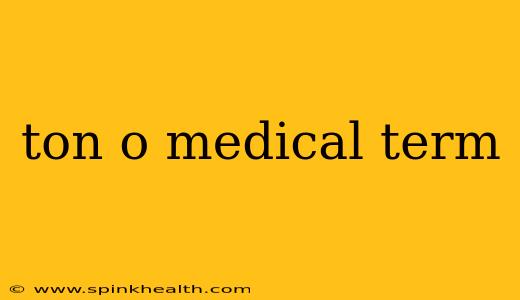Decoding the Doctor's Jargon: A Journey Through Common Medical Terms
Have you ever left a doctor's appointment feeling more confused than enlightened? The medical field is brimming with complex terminology, often leaving patients scratching their heads. This isn't surprising; medicine has its own specialized language, honed over centuries of research and practice. But understanding even a fraction of this "doctor-speak" can empower you to be a more active participant in your healthcare. Let's embark on a journey together, unraveling some common medical terms and demystifying the medical lexicon.
What are some common medical terms and their meanings?
This is perhaps the most frequently asked question when discussing medical terminology. The answer, of course, depends on the context. However, we can explore some frequently encountered terms across various medical specialties. Let's begin with a few foundational terms:
- Diagnosis: This refers to the identification of a disease or condition based on symptoms, physical examination, and diagnostic tests. A diagnosis is the crucial first step towards treatment.
- Prognosis: This is a prediction of the likely course of a disease and the chances of recovery. A positive prognosis suggests a favorable outcome, while a poor prognosis indicates a less optimistic outlook.
- Symptoms: These are subjective experiences reported by the patient, such as pain, fatigue, or nausea. They are crucial clues in the diagnostic process.
- Signs: These are objective indicators of disease detected by a healthcare professional during a physical examination. Examples include fever, rash, or abnormal heart sounds.
- Acute: This describes a condition with a sudden onset and relatively short duration. For example, acute bronchitis develops quickly and typically resolves within a few weeks.
- Chronic: This signifies a long-lasting condition, often lasting for months or years. Chronic conditions like diabetes or hypertension require ongoing management.
- Benign: This term is used to describe a non-cancerous growth or tumor. While benign tumors can still cause problems depending on their location and size, they do not spread to other parts of the body.
- Malignant: This is the term for a cancerous tumor that can invade surrounding tissues and spread to other parts of the body (metastasize).
What are some medical terms related to the heart?
Cardiovascular health is a major concern for many, making understanding heart-related terminology vital.
- Cardiomyopathy: This refers to diseases of the heart muscle that make it harder for the heart to pump blood effectively.
- Arrhythmia: This is an irregular heartbeat, which can range in severity from mildly inconvenient to life-threatening.
- Angina: Chest pain or discomfort caused by reduced blood flow to the heart muscle. Often a symptom of coronary artery disease.
- Myocardial infarction (MI): Commonly known as a heart attack, this occurs when blood flow to a part of the heart is completely blocked, causing damage to the heart muscle.
What are some medical terms related to the brain?
Neurological conditions can be incredibly complex, demanding a strong understanding of the associated terminology.
- Stroke: A sudden disruption of blood supply to the brain, leading to brain cell damage. There are two main types: ischemic (blocked artery) and hemorrhagic (bleeding in the brain).
- Dementia: A general term for a decline in cognitive abilities, including memory, thinking, and judgment, severe enough to interfere with daily life. Alzheimer's disease is the most common type of dementia.
- Epilepsy: A neurological disorder characterized by recurrent seizures. Seizures are sudden bursts of electrical activity in the brain.
- Multiple sclerosis (MS): A chronic autoimmune disease affecting the brain and spinal cord, leading to a wide range of neurological symptoms.
How can I learn more medical terms?
Learning medical terminology is a journey, not a sprint. Start with terms relevant to your personal health concerns or interests. Using medical dictionaries, online resources, and engaging with reputable healthcare information websites can significantly enhance your understanding. Remember, empowering yourself with knowledge is a crucial step towards better health management.
This exploration only scratches the surface of the vast medical lexicon. However, by understanding these fundamental terms, you can approach your healthcare interactions with increased confidence and clarity. Remember, don't hesitate to ask your doctor to clarify any unfamiliar terms—it's your right to understand your health.

